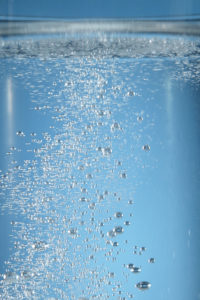
There are lots of things that can be annoying about hard water, from decreasing how effective soaps and detergents are to increasing how dry and brittle your hair gets, but the most time-consuming part is cleaning up after it. Wait, cleaning up after water? Yes, because hard water can cause staining on surfaces ranging from bathtub and tile to the fixtures. Hard water won’t hurt you, but it is a nuisance so read on for some tips and information to help battle it.
Hard Water Stains
Hard water is water that has a high concentration of minerals because it bases through mineral-rich deposits, typically limestone and gypsum. Those minerals deposit on the surface when the water sits and dries there. These deposits look like a chalky, white residue left behind. While these stains are most noticeable where you see them easily, on shower walls or doors or on sinks and faucets, they also build up inside appliances like your washer, water heater, or dishwasher.
Removing Them
Hard water stains are not super difficult to remove, but the more they build up the more work you will have to clean them. There are many cleaners on the market, but you have to make sure you are using one that is appropriate for your surface material. For instance, most shower tile is pretty durable, but some (especially natural stone, like granite) needs special cleaners. Once you find a cleaner that is safe for your surface, follow the instructions carefully, especially if it requires a special type of brush or cloth (this is especially likely for sealed natural stone surfaces). Finally, when you rinse away the cleaner, dry the surface carefully so the rinse water doesn’t leave new stains as it dries.
Preventing Them
If you want to prevent hard water staining altogether, you either have to prevent the hard water from drying on a surface or soften the water. There are commercial water softeners available that can help to remove the minerals before the water gets to your sink or tub. Alternatively, you could thoroughly dry the surface each time the water is used, making sure to wipe up all of the wetness and therefore all of the minerals before they can deposit. If you have glass shower doors, keeping a squeegee in there to remove water after a shower will save lots of time.
All of Your Plumbing Needs from Master Plumbing
Give Master Plumbing a call at (301) 650-9100 or contact us online to get more information on how our expert plumbers can help you with your dripping faucet (or just about anything else plumbing related!). We have received Angie’s List Super Service Award recognition for plumbing and drain cleaning every year since 2007, in addition to the Best Plumber award from Best of Bethesda. We are fully licensed, bonded, and insured and our service is unparalleled. Give us a call today—you won’t regret it! To see examples of our projects, follow us on Facebook, Twitter, and Pinterest.
